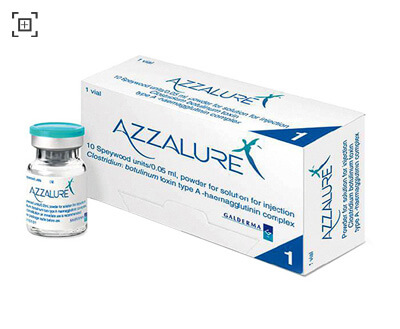 How does it work?
How does it work?
Azzalure doses contain the active ingredient botulinum toxin type A, which is a toxin produced by the bacteria Clostridium botulinum.
Botulinum toxin type A is a bacterial toxin that prevents nerves from functioning normally (a neurotoxin). It prevents nerves from releasing a chemical called acetylcholine, which is essential for the nerves to communicate with muscle cells. This toxin therefore prevents muscles from receiving nerve stimulation.
Preventing nerve stimulation of muscles causes the muscles to become paralysed. Botulinum toxin type A causes muscle paralysis until such time as the nerve develops new endings to communicate with the muscles.
Azzalure doses are administered into the muscle above and between the eyebrows to temporarily paralyse and relax these muscles. They are used to cosmetically improve the appearance of vertical frown lines between the eyebrows.
These doses only provide a short-term improvement. They are only used when the appearance of frown lines is prominent and is having an important psychological effect on an individual.
An improvement in the appearance of the frown lines between the eyebrows is generally seen after two or three days. The effect of these doses lasts for up to four months. For a continued effect you would need to keep having the doses every three to four months.
What is it used for?
To temporarily improve the appearance of severe vertical frown lines between the eyebrows in adults under 65 years of age, when these frown lines are having an important psychological impact.
Warning!
Following treatment with this medicine you may develop temporary visual disturbances, dizziness and muscle weakness that may affect your ability to drive and operate machinery. If affected you should not drive or use machines until your vision improves.
If you develop any swallowing, speech or breathing problems after having treatment with this medicine, you should consult your doctor immediately.
Too frequent or excessive use of this medicine can cause the body to produce antibodies against the medicine, which could make it less effective. There should be an interval of at least three months between treatments with these doses.
This medicine contains albumin, which is obtained from human blood. There is a small risk of viral infection associated with the use of this medicine, because the risk of transmitting infectious agents cannot be eliminated fully when using human blood products.
Use with caution in
- People with inflammation in the area to be delivered.
- People with excessive weakness or wasting in the muscle to be delivered.
- People at risk of bleeding after an use into a muscle, for example due to blood clotting disorders such as haemophilia, or treatment with anticoagulant medicines.
- People with a history of swallowing difficulties (dysphagia), or food or liquid accidentally going into the lungs (aspiration).
- People with chronic breathing difficulties.
- Diseases or conditions affecting the nervous system and muscles (neuromuscular conditions) for example motor neuropathy, in which there is progressive degeneration of the nerves that activate the muscles.
- People who have recently had surgery or are due to have surgery in the near future.
- People who have recently had an operation or injury to the head, neck or chest.
Not to be used in
- People with an infection at the site of use.
- People who have previously had an allergic reaction to botulinum toxin type A doses.
- Abnormal muscle weakness (myasthenia gravis)
- Chronic disease affecting the muscles (Eaton Lambert syndrome).
- A condition called amyotrophic lateral sclerosis, in which there is progressive degeneration of the nerves that activate the muscles.
- People over 65 years old.
- Children under the age of 18 years.
- Pregnancy.
- Breastfeeding.
This medicine should not be used if you are allergic to one or any of its ingredients. Please inform your doctor or pharmacist if you have previously experienced such an allergy.
If you feel you have experienced an allergic reaction, stop using this medicine and inform your doctor or pharmacist immediately.
Pregnancy and breastfeeding
Certain medicines should not be used during pregnancy or breastfeeding. However, other medicines may be safely used in pregnancy or breastfeeding providing the benefits to the mother outweigh the risks to the unborn baby. Always inform your doctor if you are pregnant or planning a pregnancy, before using any medicine.
The safety of this medicine for use during pregnancy has not been established. It should not be used during pregnancy unless considered essential by your doctor. Seek medical advice from your doctor.
It is not known if this medicine passes into breast milk. It is not recommended for the treatment of women who are breastfeeding. Seek medical advice from your doctor.
Side effects
Medicines and their possible side effects can affect individual people in different ways. The following are some of the side effects that are known to be associated with this medicine. Just because a side effect is stated here, it does not mean that all people using this medicine will experience that or any side effect.


